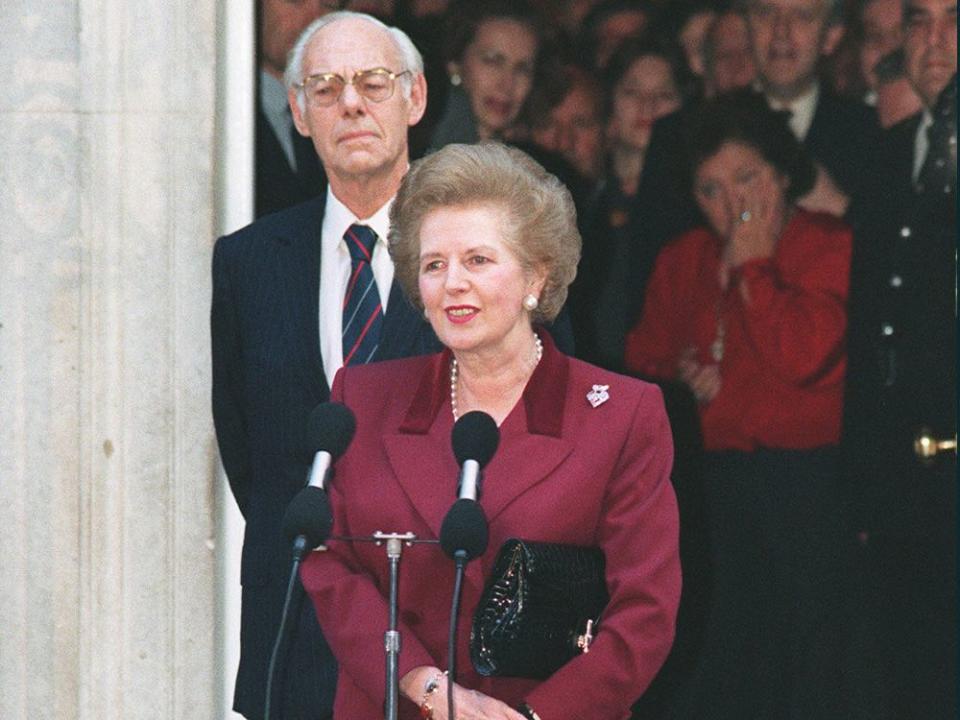Terence Corcoran: Bring back the original Thatcherism

As the British pound, Canadian dollar and other currencies bobble in a sea of uncertainty, as energy prices and interest rates soar, stocks plummet, government deficits rise and recessions loom, the politics of economics seems to have overtaken sound economic policy. What’s the alternative? There may be no better source than the United Kingdom’s experience back in the early 1980s when Margaret Thatcher was prime minister.
Across the world’s major G7 nations and beyond, political leaders are today setting key policies based more on populist marketing principles than on solid economic foundations. To fend off recession and offset inflation, governments are twisting and turning in a policy hurricane. Cut taxes to ease inflation, raise taxes to curb corporate gouging, increase spending to offset impacts of rising prices, raise interest rates to halt inflation — on it goes.
Taking a look back at 1981 Britain under Margaret Thatcher’s legendary term as prime minister may help redirect the policy winds back into directions long ago abandoned.
The idea of looking at Thatcher’s economic policies, particularly at her government’s famous knock-down budget delivered at the peak of the United Kingdom’s 1981 inflation and growth crisis, stems from a commentary this week by British monetary economist Tim Congdon. Writing from his Institute of International Monetary Research at the University of Buckingham, Congdon took issue with the prevailing view that the economic policies of Britain’s new prime minister, Liz Truss, and her Chancellor, Kwasi Kwarteng, hark back to the grand old days of 1981.
Truss has claimed to be a Thatcherite, and some British media have said Thatcher would approve of the tax cuts and deficit-spending introduced last week by Truss’s chancellor — even though the budget sent the British pound into a plummet and triggered a Bank of England monetary injection into the bond market.
Congdon writes that the 2022 Truss/Kwarteng special fiscal operation runs in the opposite direct from Thatcher’s 1981 budget. “In content and form, it was the exact opposite of the 1981 budget, and the ideas behind it are the antithesis of those which informed so-called ‘Thatcherite monetarism.’” He also calls Trussonomics “a wild and reckless adventure.”
Congdon would be a good place to start in comparing Thatcher and Truss on fiscal and monetary policy thinking. He has long been at the centre of The 40-Year War of the 1981 Budget, a scarred ideological battlefield that has gripped the British economics profession. Millions of words have been spilled by warring economists over the budget, including a 2014 tome titled Expansionary Fiscal Contraction: The Thatcher 1981 Budget in Perspective.
Within days of the 1981 budget, a now famous condemnation of the Thatcher plan was signed by 364 prominent economists. “There is no basis in economic theory or supporting evidence for the Government’s belief that by deflating demand they will bring inflation permanently under control and thereby induce an automatic recovery in output and employment,” they said.
Three key policy areas — the same hot issues that dominate macroeconomic policy discourse today — are at the heart of the Thatcher budget debate: tax policy, deficit policy, and monetary policy.
It is important to remember that U.K. inflation hit 22 per cent in 1980-1, the GDP lost more than six per cent, and the government’s budget deficit was heading toward £13.5 billion (£50 billion in 2022 currency).
To get out from under the inflation-deficit mess, the Thatcher budget set out an unconventional plan based on new ideas. It called for raising taxes and cutting spending to help reduce the deficit, thereby reducing the future size of government debt. It also backed tight control over money supply expansion, following some of the rules of monetarism prescribed by U.S. economist Milton Friedman.
Within a year or two after the budget, the U.K. deficit had fallen to £8.5 billion, growth had rebounded to more than five per cent and inflation dropped to less than four per cent.
Terence Corcoran: UN makes its own case for dismantling the outdated institution
Terence Corcoran: Steven Guilbeault asks: 'What’s woke?' Some answers
Terence Corcoran: Pierre Poilievre’s not-so-free trade ideas
Current policy in the U.K. and other countries tracks in the opposite direction. Last week’s Truss/Kwarteng budget cut taxes instead of raising them, and plotted an increase in spending that would send the U.K. deficit to £72 billion. In response, the Bank of England is back into a form of monetary expansion.
So which policy is right: Cut taxes, increase spending and let the deficit grow to stimulate the economy and force looser monetary policy? Or follow Thatcherism: Raise taxes, cut the deficit, control government debt and cut money supply.
As Congdon notes, paying interest on debt serves “hardly any useful purpose.” It requires more taxation and “merely redistributes between taxpayers and bondholders, and the taxation needed to pay for it has the same disincentive and distortive effects as taxation in general.” The tax cuts in one year expand the future size of the state and increase future government spending.
Is Congdon right or were the 364 economists who trashed Thatcherism correct? One of the professors who launched the 364 petition, Robert Neild — in a chapter in Expansionary Fiscal Contraction — offered a limited apology in 2014. “I now see that monetarism, despite its fallaciousness, served a useful purpose: it provided a veil for the severe deflation that was needed to stop the inflationary spiral.” Later, he adds: “I now give her credit.”
More could be said, but this column has gone as far as it can without armoured-tank protection onto the battlegrounds of The 40-Year War over the benefits of Thatcherism.
• Email: tcorcoran@postmedia.com | Twitter: terencecorcoran
